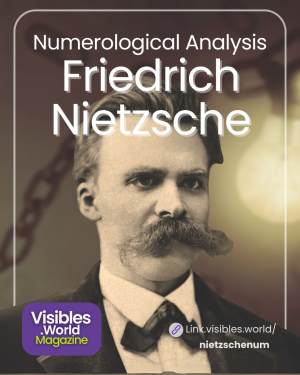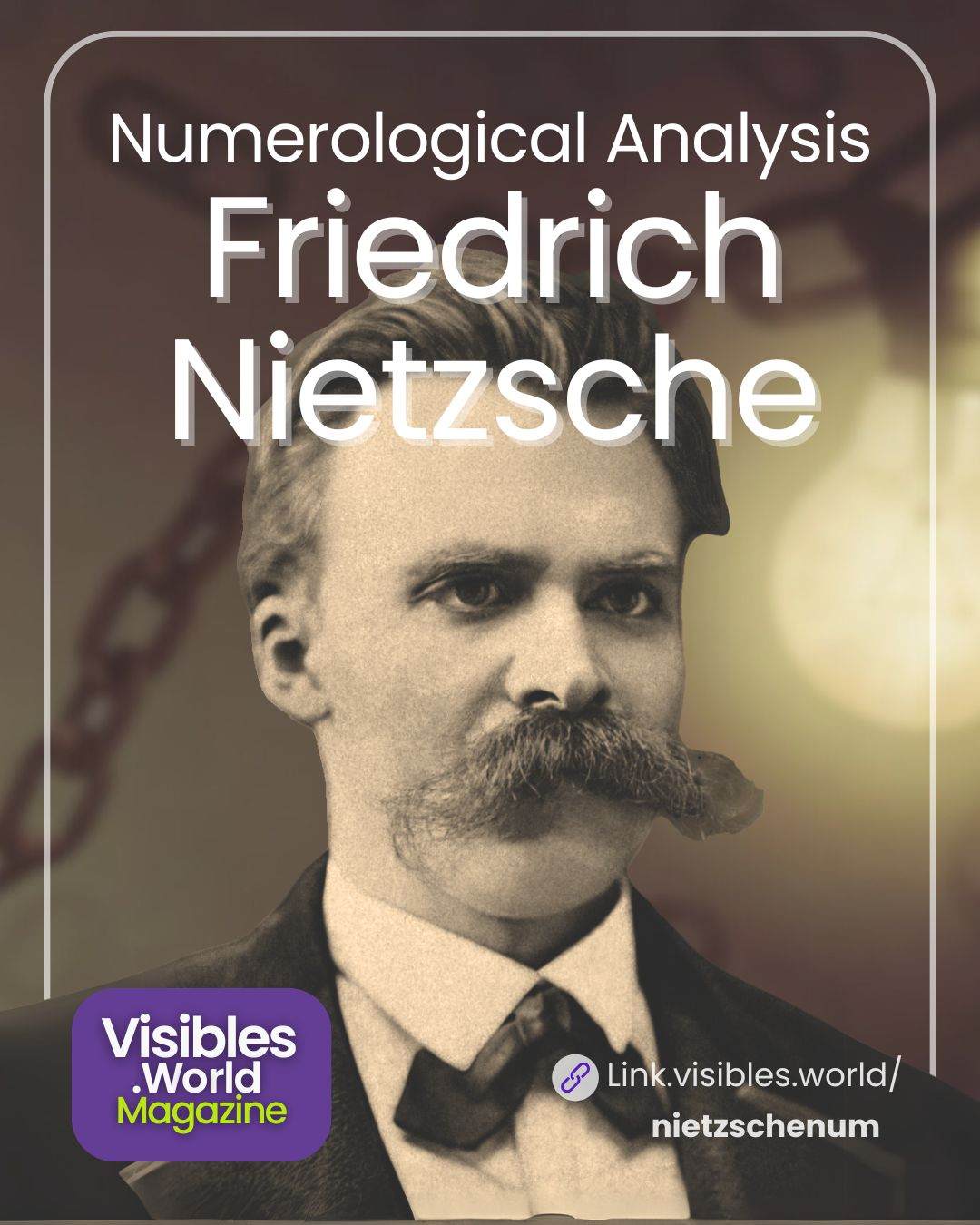Friederich Nietzsche's Numerology: A Journey into its Essence
Destacados Visibles World, Agencia Creativa de Comunicaciones
Exploring the Numerology of a Legendary Philosopher
Today we will explore the fascinating numerology of Friederich Nietzsche, a philosopher whose ideas have endured through time. Join us through the collaboration of the outstanding Chilean Therapist and Numerologist, Lorena Vargas Jimenez, LoreCachuelmó and her numerological analysis, on which this article is based.
Discover how her numbers reflect his essence and the talents that shaped his work.
Index
- Introduction to Nietzsche
- Nietzsche's Solitary Life
- Don Quixote and his Struggle
- The Mental Disconnection
- Nietzsche's Legacy
- The Importance of His Name
- Access to Divine Knowledge
- Conclusions on his Numerology
- Closing with a Reading of 'Thus Spake Zarathustra'.
- Frequently Asked Questions
Introduction to Nietzsche
Friederich Nietzsche, a name that resonates in the corridors of contemporary thought. His philosophy, full of nuances and provocations, invites to a deep reflection on existence, morality and the essence of the human being. Since his birth on October 15, 1844, Nietzsche became a sharp witness of his time, challenging norms and exploring human nature with a unique gaze.
Lorena Vargas' Encounter with Friederich Nietzsche
Lorena related to us that her journey into Nietzsche's work began in an unexpected way:
"I remember the first time I came across one of his books; it was as if a spark ignited inside me. Despite having heard his name on multiple occasions, I had never had the opportunity to immerse myself in his thought. However, the pandemic provided me with the time and motivation to explore his philosophy further.
It was my son who prompted me to apply for a workshop at the university. Although I was hesitant at first, his enthusiasm was infectious. "Do it, Mom," he would say. And so, with a little nervousness and a lot of curiosity, I sent my letter. The response was unexpected: I had been accepted, while he, despite his background in philosophy, was not. This twist of fate led me on a journey of self-discovery and learning in the company of other Nietzsche enthusiasts."
The Invitation to the online workshop on Nietzsche's Philosophy that changed everything in Lorena Vargas' world.
The invitation to that workshop was the turning point in my life. At a time when the world felt uncertain and chaotic, I discovered a community of thinkers who shared my desire to explore Nietzsche's legacy. The talks, led by Chilean philosopher Martín Hopenhayn, were a balm for my soul. Each session was a deep dive into the mind of Nietzsche, a journey that promised to open new doors of understanding.
The online workshop was an enriching experience. We came together, each from our own corner of the world, to discuss ideas, reflect and, above all, learn. Nietzsche's philosophy, with its emphasis on the will to power and self-improvement, resonated with each of us. It was as if he was guiding us through his words, urging us to question our own lives and aspirations.
The interaction with other participants made the learning even more meaningful. Sharing opinions, debating interpretations and discovering different perspectives enriched my understanding of Nietzsche. Each conversation felt like another step towards deeper knowledge, a journey that was not only intellectual, but also emotional.
The Beauty of Reading Together
Reading in company is an experience that transcends mere comprehension of a text. In our group, each reading was transformed into a living dialogue. Nietzsche's work, with its poetic prose and provocative ideas, was laid bare before us in each session. We discussed passages, shared concerns, and discovered connections we might not have seen individually.
The beauty of this activity lay in the diversity of thought. Everyone brought their own background and experiences, which enriched the analysis. Reading became an act of shared creation, where critical thinking and interpretation were woven into a fabric of interesting ideas. In the pandemic, the opportunity arose to delve deeper into his work, a gift in the midst of uncertainty. By immersing oneself in his texts, a universe opens up where the will to power and self-improvement become beacons of light.
Willpower as a central concept in the works of Friederich Nietzche
Willpower, a central concept in Nietzsche's work, invites everyone to look inward. This inner drive, which leads us to overcome our limitations, becomes a recurring theme in his writings. Learn to listen to that voice that urges you to be more, to transcend the everyday and embrace the greatness that resides within you.
Friedrich Nietzsche's Numerology
Friedrich Nietzsche was born on October 15, 1844. His life was marked by the search for truth and the exploration of the human condition. From his childhood, marked by health problems and family demands, to his years of isolation, his existence was full of challenges; these helped forge his character and thought. Each biographical fact is interwoven with his philosophy, creating a rich and complex narrative.
He was often seen as a solitary thinker, but behind that image is a story of perseverance and deep longing.
Nietzsche, with his extreme sensitivity, confronted his inner beliefs, personal, family and thought programming, as well as the external programming and doctrines of society. His experience was not only with his own body, but also with the limitations that society imposed on him. In her writings, one perceives the voice of someone who seeks to break chains, someone who refuses to accept norms without questioning them. This personal enclave becomes the core of her philosophy, a call to all of us to find our own voice and challenge the established.
The Soul Number: 6 and Its Meaning
In numerology, Nietzsche's day of birth, the 15th, translates into a six, the number of the soul (1+5=6). This number reflects a deep sensitivity, a search for harmony and a desire to serve others. In its essence, Nietzsche invites us to connect with our own souls, to discover the beauty that lies within.
The Burden of 33 (Thirty-Three)
Friederich Nietzsche's life was marked by the complexity of his being, symbolized in the number 33, known as a master number in numerology. This number not only represents a high level of intelligence, but also a significant emotional charge. Nietzsche, with his almost obsessive perfectionism, dedicated himself to transmuting and channeling it through his work with a meticulousness that few can match.
The solitary life he led allowed him to concentrate on his work, but it also imposed a burden on him. As mentioned, "the grace of this thirty-three six is that he is so intelligent." This intelligence was not only reflected in his writings, but in his ability to connect deeply with human emotions. Every aphorism he left behind is a lesson, a glimpse of his vast understanding of the world.
It is interesting to note how this master number led him to a life of introspection, where solitude became his most constant companion. "This number, in a way, needed to have that solitary life to have been able to write what he wrote." A burden that, though heavy, allowed him to create a legacy that continues to resonate strongly today.
Nietzsche's Lonely Life
Friederich Nietzsche's life was marked by a profound loneliness. This solitude was not simply a state of isolation; it was a "forced choice" because of his physical pain and his search for truth. As mentioned, "this burden forces him to be on the move and to isolate himself". This isolation allowed him to immerse himself in his work, creating a space where his philosophical voice could flourish.
Nietzsche led an austere life, meticulously guarding his diet. "He had a solitary, austere life, because in addition as he could not eat (foods that we consider delicious) and obviously not drink or anything (drinks, alcohols)," which led him to be his own doctor. This attention to his body connected him deeply with his writing, creating an intimate relationship between his suffering and his intellectual production.
Work and Perfection
The number thirty-three, which resonates in Nietzsche's life, symbolizes a quest for perfection. This number translates into a six, the number of the soul, which also reflects great intelligence. "You put a thirty-three six to work anywhere and it always excels," Lorena explains, suggesting that his dedication and meticulousness were integral to his character.
Nietzsche was known for his almost obsessive perfectionism. "He is a perfectionist, well-executed, meticulous work," which is reflected in the way he structured his aphorisms. Each of his writings is a testament to his commitment to quality and depth, making him an exceptional author.
The Connection to his Writing
It is fascinating how Nietzsche's writing becomes a vehicle for his deepest expression. "He speaks in a part that gave him like a tickle when writing," a feeling that drove him to create. This connection, almost electric, between his being and his work is a fundamental aspect of his legacy.
Nietzsche's sensitivity allowed him to transcend the everyday and connect with the sublime. When he wrote, he "became so immersed in what he was writing," suggesting that his creative process was an almost transcendental experience. This depth of thought and feeling is what distinguishes him as a philosopher.
Loneliness and Love
Despite his desire for connection, Nietzsche lived most of his life alone. "He had the bad luck that the only woman who asked him to marry rejected him," referring to Lou Salome, who was a key character in his life. This rejection left an imprint on his being, shaping his perspective on love and human relationship.
Nietzsche's longing for companionship was countered by his dedication to philosophy. "These two six wanted to have a family, they wanted to have a wife, to have their home, their children," but his destiny led him down a different path, one of introspection and reflection. Solitude, though painful, was a space where his creativity flourished.
The European Journey
After his time in Switzerland, Nietzsche began to wander around Europe, seeking climates that would do his body good. "He began to travel through France, through Italy, Venice," a move that symbolized his desire to experience life in its entirety. These trips were not only a quest for health, but also an exploration of her identity and philosophy.
Connecting with different cultures and landscapes enriched her perspective and her writing. "He felt those warmer climates did his body good," indicating how the environment influenced his emotional and creative state.
Every place he visited left an imprint on his thinking. The culture, art and beauty of Europe fueled his creativity and his desire to understand the world. This mobility also reflected the restless nature of his mind, always in search of new ideas and perspectives.
The Sensitivity of his Body
Nietzsche's relationship with his body is a recurring theme in his life and work. "He was very sensitive to what his body felt," which translates into meticulous attention to his health. This approach allowed him to maintain his creative capacity despite the adversities he faced.
Nietzsche's physical sensitivity comes through in his writing, where his pain and suffering are intertwined with his philosophical thoughts. "He was the one who prescribes the herbs he has to take and takes care of himself," which reinforces his role as a thinker who not only reflects on life, but also actively seeks his well-being.
As Lorena explains: the pain he experienced was a formative element in his philosophy. "Pain eats away at you," suggests that his life was marked by constant suffering, which allowed him to explore the depths of the human condition. His legacy is a testament to how pain can be a catalyst for growth and reflection.
The Power of 10 (Ten)
The number ten, symbolizing courage and bravery, is a crucial aspect of Nietzsche's life. "Ten is that he has courage, bravery, cojones, leadership," reflecting his willingness to challenge established norms. This inner strength led him to become a rebel, a thinker who dared to question the morals and institutions of his time.
Nietzsche's courage translates into his writing, where he tackles complex issues with biting irony. "This ten also gave him the strength to be able to achieve his accomplishment," suggesting that his ability to face adversity was a driving force in his life and work. His legacy is, in many ways, a testament to this inner strength.
Music and Dance in her life
Music and dance were essential elements in Nietzsche's life. "Nietzsche loved music, he loved dance, he loved laughter," indicating that his connection to these art forms was profound. Music was not only a delight, but a source of inspiration that fueled his creativity.
Dance, in particular, symbolizes freedom and expression, concepts that Nietzsche embraced throughout his life. "Perhaps this is why eight was also based on Zorba - the Buddha," suggesting that his appreciation for aesthetics was intertwined with his philosophy. Music and dance were, for him, ways to transcend suffering and connect with the divine.
The Mission of Being: 9 (nine)
Nietzsche's mission of being can be unraveled through his birth date and name. "The mission of being is brought out by the day of birth, from fifteen, which becomes six," which brings us to the essence of his philosophical quest. This number, nine, symbolizes the culmination of his journey and his struggle against adversity.
Nietzsche became a symbol of resistance, a "Quixote of La Mancha" who fought against windmills. His life and work reflect a constant search for meaning, a journey towards truth that continues to resonate in contemporary thought. In every written word, we find the essence of his mission: to challenge, inspire and transform.
Don Quixote and his Struggle
Friederich Nietzsche is, without a doubt, the Quixote of his time, a warrior who fights against a sleeping society that functions as a "flock." In his work, we find a reflection of this constant battle, a cycle of resistance and defiance. As he himself said, "he fights, fights, fights" against a world that seems comfortable and asleep.
This fight is not only external; it is also internal. Nietzsche faces his own demons, the loneliness that accompanies him on his journey. "At first only people accompany him, but in the end he continues the fight alone," a testament to his commitment to truth, even when it means walking alone. His life becomes a journey towards authenticity, where every step is an affirmation of his will.
His Academic Career and Freedom
Nietzsche's academic career began at the age of 24, when he was hired at the University of Basel. This was an important moment that granted him some freedom. Renouncing his Prussian citizenship was an act of rebellion, a desire to free himself from the bonds of a system he did not understand. "He didn't want that," it is said, and this decision marked the beginning of his path to intellectual independence.
Working in Switzerland, Nietzsche found a space where he could express his ideas without the restrictions of his homeland. This freedom allowed him to explore his thinking without the pressure of social expectations. The connection between his work and his desire for autonomy is evident in his philosophy, which challenges established norms and seeks truth above all else.
Mental Disconnection and Self-Care
Nietzsche's mental disconnection occurred at a time of great emotional intensity. The image of a battered horse was the trigger that caused him to lose his mind. This tragic episode highlights the vulnerability of a man so sensitive that his own suffering was intertwined with the pain of others. "This man so sensitive, but who came to do his work, to fight against all these established things," Lorena points out, highlighting Nietzsche's constant struggle against the suffering that surrounded him.
This moment of rupture not only marked his life, but also underscores the importance of self-care. In his search for truth, Nietzsche teaches us that at times, sensitivity can be a heavy burden. However, it also becomes an inexhaustible source of creativity and reflection.
The Importance of Being Self-Sufficient
One of the most powerful lessons Nietzsche leaves us with is the importance of self-sufficiency. "I am very interested in the fact that I decide, I am the architect of my life," says Lorena, reflecting the essence of Nietzsche's thought. In a world where we often feel pressured by societal expectations, Nietzsche invites us to take charge of our lives and not settle for mediocrity.
This message resonates strongly today. Self-sufficiency is not only an act of rebellion, but a form of personal empowerment. Friedrich Nietzsche, in his quest for truth, urges us to be courageous, to question the established and to forge our own path.
Nietzsche's Legacy
Nietzsche's legacy is monumental. His ideas, his writings, and his way of challenging the established continue to resonate in contemporary thought. "He is Friedrich Nietzsche, a revolutionary who fought with something wonderful," his word becomes a beacon for those who seek to question and reflect on their own existence.
Nietzsche invites us to be "architects of our lives," to recognize that we are not mere victims of circumstances, but that we have the power to decide our own path. This philosophy of self-sufficiency and authenticity is a gift he leaves us, an invitation to explore our own greatness and creativity. "Not the state, not society," a statement that resonates in a world where conformity is often celebrated.
The Importance of his Name
Friedrich's name carries with it deep symbolism. In analyzing it, Lorena found something very interesting, "I underlined all the I's, which add up to a total of 27 (twenty-seven), and lead us back to the number nine."
This number not only represents creativity, but also a keen sensitivity and a burning passion for change. "It is like the man who is either very intelligent or he is an ignoramus," reflecting the duality we often find in his work.
The strength of his graphics translates into his ability to impact and transform. "He was able to transcribe, because he also speaks of a great sensitivity," his writing is a testament to his commitment to truth and beauty. This passion for truth is what drives him to question the established and challenge the norms of his time.
Access to Divine Knowledge
The number 8 (eight) in Nietzsche's numerology suggests a special access to divine knowledge. "It is said that when a person has done well in life, has an eight on the staff, he has a moment when he can access divine knowledge." This idea of openness to the transcendental is fascinating, especially when we consider the depth and richness of his writing.
Reading his aphorisms, one can feel that "language of such a high level" that not only invites us to reflect, but moves us to question our own existence. "He had the possibility of opening the floodgate," and in his work, we find a path to truth that transcends the ordinary. Nietzsche not only speaks to us about life; he invites us to experience the divine in the everyday.
Conclusions on his Numerology
Nietzsche's numerology reveals a man of complexities and nuances. With numbers such as six, eight, nine, ten and thirty-three, we find a profile that reflects both his inner challenges and his capacity for transformation. "A great numerology for a great man, for a great philosopher," a recognition of his impact on modern thought.
Each number tells a story, each digit reflecting a part of his being. In this sense, Nietzsche is not just a thinker, but a symbol of resistance and authenticity. By exploring his numerology, we get a little closer to the essence of a man who challenged the limits of his time.
Closing with a Reading of 'Thus Spake Zarathustra'.
To culminate this exploration, Lorena shared an excerpt from "Thus Spake Zarathustra," where Nietzsche expresses the depth of his soul. "It is night, at this hour all springs speak loudest, and my soul too is a spring." This passage resonates with the essence of his quest, a journey towards truth and connection with the divine.
"There is in me something unsatisfied, something insatiable that wants to speak," an echo of her constant struggle to find meaning in a world that often seems empty. This longing for connection, for love and understanding, is what makes him a timeless thinker, whose words continue to touch the hearts of those who seek truth.
Lorena ends by saying: "Studying Nietzsche after having made my spiritual path, enriched me and gave me insight into my personal processes. Thank you for your legacy Friederich Nietzsche! "
Learn Numerology with Lorena
We invite you to visit her website www.lorecahuelmo.cl and learn about her numerology workshops, meditations and services that she offers online and in person in Providencia, Santiago de Chile.
We also invite you to watch the complete video of numerology by Friederich Nietzsche.
Frequently Asked Questions
- What is the importance of numerology in Nietzsche's work? Numerology offers a window into the essence of his being, revealing patterns and meanings that enrich our understanding of his philosophy.
- How does loneliness influence Nietzsche's thought? Loneliness is a recurring theme in his work, allowing him to deepen his search for truth and authenticity, but also generating profound suffering.
- What role does his name play in his legacy? Friedrich's name is a reflection of his sensitivity and creativity, symbolizing his struggle and his desire for transformation in a world in need of change.
- Why is Nietzsche relevant today? His philosophy invites reflection on authenticity, self-reliance and defiance of established norms, themes that remain relevant in the contemporary world.
- Where to study numerology? Consult the website of Lorena Vargas Jiménez, www.lorecahuelmo.cl


 ES
ES  EN
EN 





